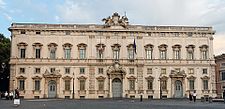Constitutional Court of Italy
| Constitutional Court | |
|---|---|
 |
|
| Established | 1948 (in the Constitution) 1955 (effective) |
| Country |
|
| Location | Rome, Italy |
| Composition method | Elected/appointed in equal portions by Italian Parliament, President of the Italian Republic, and highest Italian courts |
| Authorized by | Constitution of Italy |
| Judge term length | 9 years (not renewable) |
| Number of positions | 15 |
| Website | Official website |
| President of the Court | |
| Currently | Paolo Grossi |
| Since | 24 February 2016 |
The Constitutional Court of the Italian Republic (Italian: Corte costituzionale della Repubblica Italiana) is the highest court of Italy in matters of constitutional law. Sometimes, the name Consulta is used as a metonym for it, because its sessions are held in Palazzo della Consulta in Rome.
The Court was established by the republican Constitution of Italy in 1948, but it became operative only in 1955 after the enactment of the Constitutional Law n. 1 of 1953 and the Law n. 87 of 1953. It held its first hearing in 1956.
According to Article 134 of the Constitution, the Court shall pass judgement on
The Constitutional Court is composed of 15 judges for the term of service of nine years: 5 appointed by the President, 5 elected by the Parliament of Italy and 5 elected by the ordinary and administrative supreme courts. Candidates need to be either lawyers with twenty years or more experience, full professors of law, or (former) judges of the Supreme Administrative, Civil and Criminal tribunals. The members then elect the President of the Court, since 12 November 2014 this has been Alessandro Criscuolo. The President is elected from among its members in a secret ballot, by an absolute majority (8 votes in the case of a full court). If no person gets that many votes, a runoff election between the two judges with the most votes occurs. One or two vice-presidents, appointed by the President of the Court, stand in for the president in the event of his absence for any reason. The constitutional court passes on the constitutionality of laws with no right of appeal.
The court is a post-World War II innovation. Since 12 October 2007, when reform of the Italian intelligence agencies approved in August 2007 came into force, the pretext of state secret cannot be used to deny access to documents by the Court.
...
Wikipedia
